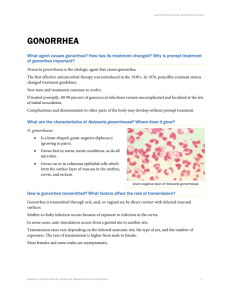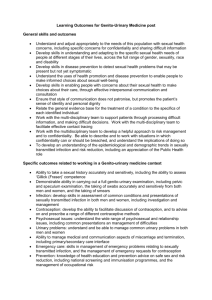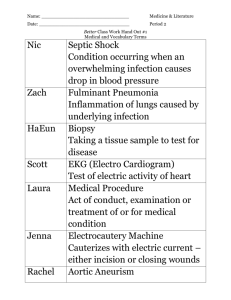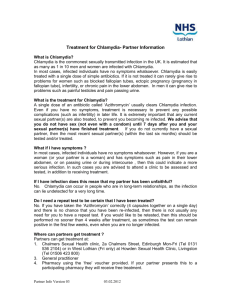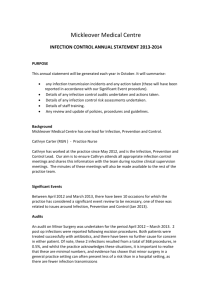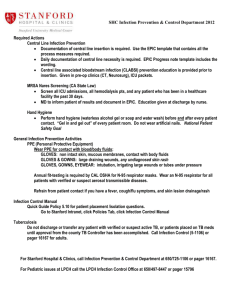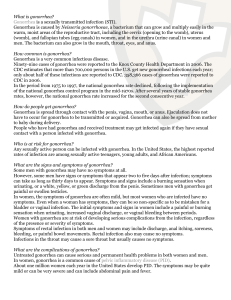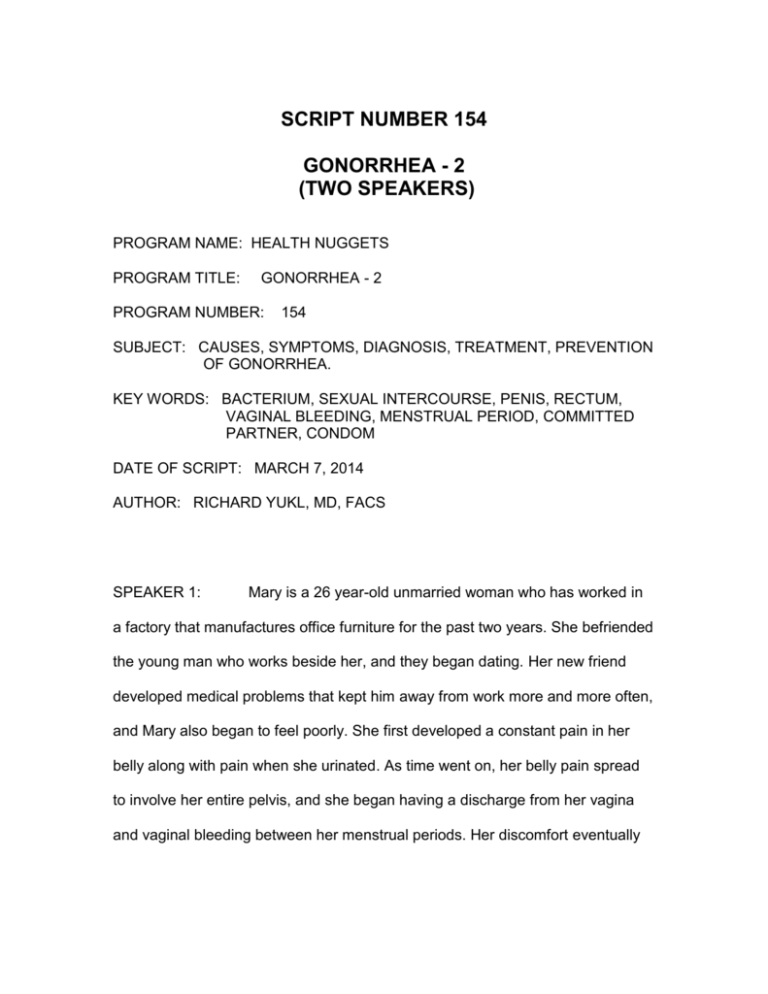
SCRIPT NUMBER 154
GONORRHEA - 2
(TWO SPEAKERS)
PROGRAM NAME: HEALTH NUGGETS
PROGRAM TITLE:
GONORRHEA - 2
PROGRAM NUMBER:
154
SUBJECT: CAUSES, SYMPTOMS, DIAGNOSIS, TREATMENT, PREVENTION
OF GONORRHEA.
KEY WORDS: BACTERIUM, SEXUAL INTERCOURSE, PENIS, RECTUM,
VAGINAL BLEEDING, MENSTRUAL PERIOD, COMMITTED
PARTNER, CONDOM
DATE OF SCRIPT: MARCH 7, 2014
AUTHOR: RICHARD YUKL, MD, FACS
SPEAKER 1:
Mary is a 26 year-old unmarried woman who has worked in
a factory that manufactures office furniture for the past two years. She befriended
the young man who works beside her, and they began dating. Her new friend
developed medical problems that kept him away from work more and more often,
and Mary also began to feel poorly. She first developed a constant pain in her
belly along with pain when she urinated. As time went on, her belly pain spread
to involve her entire pelvis, and she began having a discharge from her vagina
and vaginal bleeding between her menstrual periods. Her discomfort eventually
became so severe that she consulted the factory’s doctor. He diagnosed her as
having a bacterial infection called gonorrhea.
SPEAKER 2:
We would like to talk about gonorrhea. The infection can
occur in both men and women, and the World Health Organization estimates that
62 million people become infected every year. Gonorrhea is spread sexually, and
most people become exposed to the organism during sexual intercourse.
SPEAKER 1:
If I develop a gonorrhea infection, what are my symptoms?
SPEAKER 2:
A mild infection causes no symptoms, so you might be
infected and not even know it. As your infection worsens and symptoms occur,
they are different in men compared to women. Men have pain when they urinate,
a pus-like discharge from the tip of their penis, and pain or swelling in one
testicle. Women, on the other hand, have symptoms similar to what Mary
developed – constant pain in their belly and possibly pelvis, painful urination,
increased vaginal discharge, and vaginal bleeding between their menstrual
periods or after sexual intercourse.
SPEAKER 1:
How is a gonorrhea infection diagnosed?
SPEAKER 2:
A doctor can make the diagnosis with a simple urine test, as
the bacteria can be seen under a microscope. Gonorrhea can also be grown in
the laboratory in a culture tube.
SPEAKER 1:
Is treatment difficult?
SPEAKER 2:
Treatment requires antibiotics. A single dose of some
powerful new antibiotics can successfully treat uncomplicated infections. The
antibiotic is given either as an injection or by mouth. Penicillin used to be the
antibiotic of choice, but the organism has largely become resistant to penicillin.
The new, powerful antibiotics are currently effective treatment, but they are very
expensive. Complicated infections require a weeklong course involving multiple
antibiotics.
SPEAKER 1:
What will happen if I don’t have my gonorrhea infection
treated?
SPEAKER 2:
An untreated gonorrhea infection can lead to significant
medical problems. Inflammation of a man’s testicles and the tubes that carry
sperm can become so severe that scarring will cause him to become infertile. An
untreated infection in women can cause so much scarring of the tubes between
the womb and the ovaries that the woman can no longer become pregnant.
If you develop a gonorrhea infection, your sexual partner or partners need to
undergo testing and possible treatment, even if they show no symptoms of
infection. Mary and her boyfriend had engaged in sexual intercourse. She told
him of her infection. He allowed himself to be tested and learned that he, too,
was infected with the gonorrhea organism, and that the medical problems he was
experiencing were the result of that infection. Had he not received treatment, he
could have passed the infection back to Mary after she was successfully treated.
SPEAKER 1;
It sounds as though it is easier to keep from becoming
infected with gonorrhea than it is to treat the infection once it develops.
SPEAKER 2:
Yes, and there are choices you can make that will limit your
risk of infection. Abstaining from sex outside of marriage is, by far, the surest way
to avoid exposure to the organism. Our Creator gave us sex for more than just
making babies. The act joins two humans in the most intimate union possible.
When we join another person in a sexual union, a spiritual union takes place with
that person at the same time. Sexual love is the most beautiful way God gave us
to say "I love you,” and because having casual sexual contacts with multiple
strangers increases your risk of becoming infected, participating in a long-term,
sexual relationship with a single, committed partner will best limit your risk of
developing any sexually spread infection such as gonorrhea. Each man should
have his own wife, and each woman should have her own husband.
Should you choose to have sex with multiple, casual partners, there are some
things you can do to lower your risk of becoming infected with gonorrhea, and to
lessen the risk of developing its complications. Use a condom during any type of
sexual contact, including vaginal sex, oral sex or anal sex. By using latex
condoms correctly and consistently during sexual activity, you can reduce your
risk. Find out whether your partner has been tested for sexually spread infections
such as gonorrhea. If not, ask whether they would be willing to be tested. If your
partner has symptoms of a sexually spread infection, don’t have sex with them.
Finally, consider talking to your doctor about regular gonorrhea screening if you
have an increased risk of infection, if you have had gonorrhea in the past, if you
have a new sex partner, or if you have multiple sex partners.
Prevention of gonorrhea is becoming more and more important because
incidence of the infection is increasing, and because the organism is becoming
antibiotic resistant all around the world, making successful treatment harder and
harder. Older antibiotics have become ineffective, and the antibiotics that are
currently effective are very expensive. Without a continued commitment to
prevention, early diagnosis and effective treatment, gonorrhea may well become
untreatable in the relatively near future.
SPEAKER 1:
Health Nuggets is written by Dr. Richard Yukl, a medical
doctor working in the United States. The medical views expressed in this
program are his and may differ for your particular health needs. If you need
medical advice, please consult a medical professional in your area.


